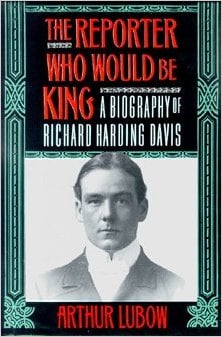Richard Harding Davis exemplified the all-American ideal of Anglo-Saxon manhood—a chivalrous adventurer of spotless character and intentions, sporting, always in favor of the underdog, not too intellectual, and never without a clean starched shirt and a portable bathtub, no matter where his career as an intrepid reporter and war correspondent might take him.
At the turn of the century he was the most celebrated war correspondent in the country. He was also a successful short-story writer, novelist, and playwright, as well as the square-jawed male counterpart to the Gibson Girl. As a star reporter he crafted rather creative crime stories, was on the scene at the Johnstown flood, immortalized Teddy Roosevelt’s charge up San Juan (actually Kettle) Hill and was captured and nearly sentenced to death by the Germans at the start of the First World War.
David also covered the Boer War—a war that brought out much of his character in fine form. Though Davis had many English friends and idealized the English country gentleman, he sided with the Boers. Not only were they the underdog, but, as his biographer points out, Davis saw the war “as a clash of cultures, and characteristically, he favored the old-fashioned and picturesque over the brutally modern.” The war also touched his sense of chivalry. Though this might not shock our coarser natures today, Davis believed, “It is not becoming that the British army should fight against women even if they are good shots.” Of course, Davis had never met our old bore Patricia Schroeder.
Nevertheless, the all-American boy and his close-knit family had their share of woe. Davis never consummated his marriage with his first wife, who, the author hints heavily, was a lesbian, and his second wife was insecure and jealous. Davis’s sister, who was a close friend of his first wife, married a homosexual Anglican priest, and Davis’s brother, to whom he was devoted, died without issue. Davis himself fathered one daughter, but he died before she was two years old.
We honor and remember some of Davis’s contemporaries—like Frederic Remington and Stephen Crane—while neglecting the golden boy of war correspondents, at least in part because we no longer share his all-American ideals. Indeed, those ideals were coming under attack even in the twilight hours of his own day. As one satirist mocked him in 1915, the year before Davis’s death: “A perfect day, for Mr. Davis, would consist of a morning’s danger, taken as a matter of course; in the afternoon a little chivalry, equally a matter-of-course to a well-bred man; then a motor dash from hardship to some great city, a bath, a perfect dinner nobly planned. Shrapnel, chivalry, sauce mousseline, and so to work the next morning. . . . Richard Coeur-de-Lion would not have disliked such a day, once he was used to the shrapnel.” But the satirist continues on: “Have you never, although you may be rather chivalrous yourself, in a modest way, risen from the perusal of Mr. Davis on chivalry with a determination never again, no matter how infirm the woman standing in front of you might be, or how heavy-laden, to rise from your seat in the ear for her sake?” Well, if you have, you’re a cad. But then again, that’s what we’re supposed to be nowadays, aren’t we? James Dean, Jack Nicholson, Axl Rose—need one say more?
Almost everything about Davis cuts against the grain of modern insensibility—not just his chaste, knightly ideals, but his lack of prudery about tobacco. Not only did he campaign repeatedly for more tobacco supplies for hardpressed servicemen (he thought tobacco shortages were no small hardship), but tobacco was the point of one of his most moving passages about the Boer War. At the relief of Ladysmith, Davis came across two drawn, tired, but stiff upperlipped English officers of the sort he still admired even while cheering on the Boers. He gave them each a cigar. “They lit the cigars and at the first taste of the smoke—and they were not good cigars—an almost inhuman expression of peace and good-will and utter abandonment to joy spread over their yellow skins and cracked lips and fever-lit eyes. The first man dropped his reins and put his hands on his hips and threw back his head and shoulders and closed his eyelids. I felt that I had intruded at a moment which should have been kept sacred.” An ad-writer for J.R. Reynolds couldn’t have put it better.
Arthur Lubow correctly sums up Richard Harding Davis’s place in American literary history by saying, “Had his legend been tarnished by sexual scandal or neurotic eccentricity, it would have shown brighter in the modern world. Instead, it quickly gathered dust, like an Eastlake chair in grandmother’s parlor. His hearty, boyish optimism clashed irreconcilably with the furnishings of the modern mind.” Though Lubow looks like a young fellow himself, he has done Richard Harding Davis a grand and memorable service in this fast-paced, gracefully crafted, and continually entertaining record of a hero of the ephemeral trade of journalism and its evanescent celebrity.
[The Reporter Who Would Be King: A Biography of Richard Harding Davis, by Arthur Lubow (New York: Charles Scribner’s Sons) 438 pp., $25.00]

Leave a Reply